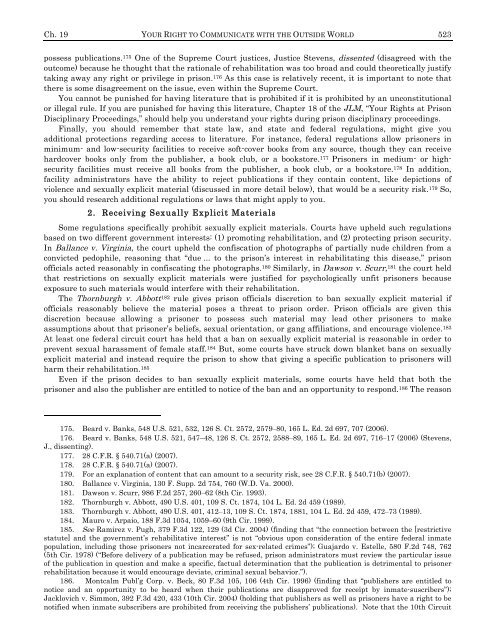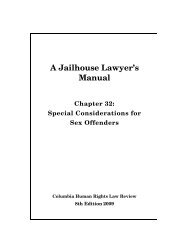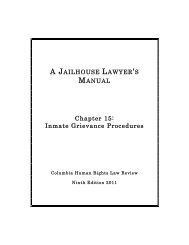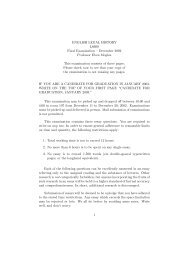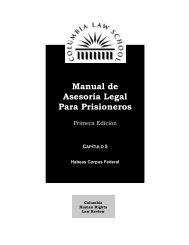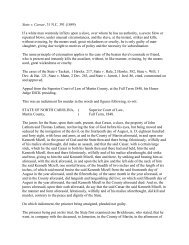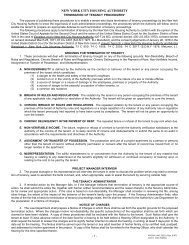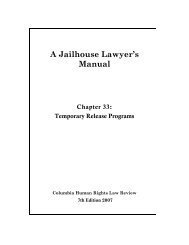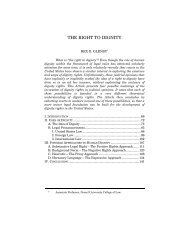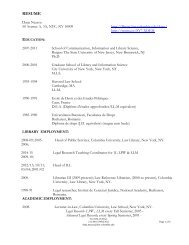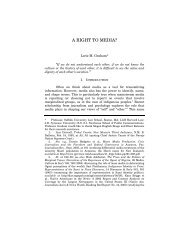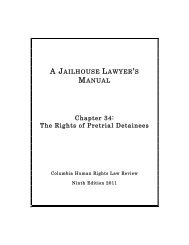Ch. 19 YOUR RIGHT TO COMMUNICATE WITH THE OUTSIDE WORLD 523possess publications. 175 One of <strong>the</strong> Supreme Court justices, Justice Stevens, dissented (disagreed with <strong>the</strong>outcome) because he thought that <strong>the</strong> rationale of rehabilitation was <strong>to</strong>o broad and could <strong>the</strong>oretically justifytaking away any right or privilege in prison. 176 As this case is relatively recent, it is important <strong>to</strong> note that<strong>the</strong>re is some disagreement on <strong>the</strong> issue, even within <strong>the</strong> Supreme Court.You cannot be punished for having literature that is prohibited if it is prohibited by an unconstitutionalor illegal rule. If you are punished for having this literature, Chapter 18 of <strong>the</strong> JLM, “<strong>Your</strong> <strong>Right</strong>s at PrisonDisciplinary Proceedings,” should help you understand your rights during prison disciplinary proceedings.Finally, you should remember that state law, and state and federal regulations, might give youadditional protections regarding access <strong>to</strong> literature. For instance, federal regulations allow prisoners inminimum- and low-security facilities <strong>to</strong> receive soft-cover books from any source, though <strong>the</strong>y can receivehardcover books only from <strong>the</strong> publisher, a book club, or a books<strong>to</strong>re. 177 Prisoners in medium- or highsecurityfacilities must receive all books from <strong>the</strong> publisher, a book club, or a books<strong>to</strong>re. 178 In addition,facility administra<strong>to</strong>rs have <strong>the</strong> ability <strong>to</strong> reject publications if <strong>the</strong>y contain content, like depictions ofviolence and sexually explicit material (discussed in more detail below), that would be a security risk. 179 So,you should research additional regulations or laws that might apply <strong>to</strong> you.2. Receiving Sexually Explicit MaterialsSome regulations specifically prohibit sexually explicit materials. Courts have upheld such regulationsbased on two different government interests: (1) promoting rehabilitation, and (2) protecting prison security.In Ballance v. Virginia, <strong>the</strong> court upheld <strong>the</strong> confiscation of pho<strong>to</strong>graphs of partially nude children from aconvicted pedophile, reasoning that “due ... <strong>to</strong> <strong>the</strong> prison’s interest in rehabilitating this disease,” prisonofficials acted reasonably in confiscating <strong>the</strong> pho<strong>to</strong>graphs. 180 Similarly, in Dawson v. Scurr, 181 <strong>the</strong> court heldthat restrictions on sexually explicit materials were justified for psychologically unfit prisoners becauseexposure <strong>to</strong> such materials would interfere with <strong>the</strong>ir rehabilitation.The Thornburgh v. Abbott 182 rule gives prison officials discretion <strong>to</strong> ban sexually explicit material ifofficials reasonably believe <strong>the</strong> material poses a threat <strong>to</strong> prison order. Prison officials are given thisdiscretion because allowing a prisoner <strong>to</strong> possess such material may lead o<strong>the</strong>r prisoners <strong>to</strong> makeassumptions about that prisoner’s beliefs, sexual orientation, or gang affiliations, and encourage violence. 183At least one federal circuit court has held that a ban on sexually explicit material is reasonable in order <strong>to</strong>prevent sexual harassment of female staff. 184 But, some courts have struck down blanket bans on sexuallyexplicit material and instead require <strong>the</strong> prison <strong>to</strong> show that giving a specific publication <strong>to</strong> prisoners willharm <strong>the</strong>ir rehabilitation. 185Even if <strong>the</strong> prison decides <strong>to</strong> ban sexually explicit materials, some courts have held that both <strong>the</strong>prisoner and also <strong>the</strong> publisher are entitled <strong>to</strong> notice of <strong>the</strong> ban and an opportunity <strong>to</strong> respond. 186 The reason175. Beard v. Banks, 548 U.S. 521, 532, 126 S. Ct. 2572, 2579–80, 165 L. Ed. 2d 697, 707 (2006).176. Beard v. Banks, 548 U.S. 521, 547–48, 126 S. Ct. 2572, 2588–89, 165 L. Ed. 2d 697, 716–17 (2006) (Stevens,J., dissenting).177. 28 C.F.R. § 540.71(a) (2007).178. 28 C.F.R. § 540.71(a) (2007).179. For an explanation of content that can amount <strong>to</strong> a security risk, see 28 C.F.R. § 540.71(b) (2007).180. Ballance v. Virginia, 130 F. Supp. 2d 754, 760 (W.D. Va. 2000).181. Dawson v. Scurr, 986 F.2d 257, 260–62 (8th Cir. 1993).182. Thornburgh v. Abbott, 490 U.S. 401, 109 S. Ct. 1874, 104 L. Ed. 2d 459 (1989).183. Thornburgh v. Abbott, 490 U.S. 401, 412–13, 109 S. Ct. 1874, 1881, 104 L. Ed. 2d 459, 472–73 (1989).184. Mauro v. Arpaio, 188 F.3d 1054, 1059–60 (9th Cir. 1999).185. See Ramirez v. Pugh, 379 F.3d 122, 129 (3d Cir. 2004) (finding that “<strong>the</strong> connection between <strong>the</strong> [restrictivestatute] and <strong>the</strong> government’s rehabilitative interest” is not “obvious upon consideration of <strong>the</strong> entire federal inmatepopulation, including those prisoners not incarcerated for sex-related crimes”); Guajardo v. Estelle, 580 F.2d 748, 762(5th Cir. 1978) (“Before delivery of a publication may be refused, prison administra<strong>to</strong>rs must review <strong>the</strong> particular issueof <strong>the</strong> publication in question and make a specific, factual determination that <strong>the</strong> publication is detrimental <strong>to</strong> prisonerrehabilitation because it would encourage deviate, criminal sexual behavior.”).186. Montcalm Publ’g Corp. v. Beck, 80 F.3d 105, 106 (4th Cir. 1996) (finding that “publishers are entitled <strong>to</strong>notice and an opportunity <strong>to</strong> be heard when <strong>the</strong>ir publications are disapproved for receipt by inmate-suscribers”);Jacklovich v. Simmon, 392 F.3d 420, 433 (10th Cir. 2004) (holding that publishers as well as prisoners have a right <strong>to</strong> benotified when inmate subscribers are prohibited from receiving <strong>the</strong> publishers’ publications). Note that <strong>the</strong> 10th Circuit
524 A JAILHOUSE LAWYER’S MANUAL Ch. 19for granting notice <strong>to</strong> publishers is that <strong>the</strong>y have a First Amendment right <strong>to</strong> communicate with individualprisoners if <strong>the</strong>y so choose. 187 Additionally, at least one court has held that prisoners have a right <strong>to</strong> appealcensorship decisions <strong>to</strong> someone o<strong>the</strong>r than <strong>the</strong> official who ordered <strong>the</strong> censorship. 188In Thornburgh v. Abbott, one of <strong>the</strong> regulations at issue allowed <strong>the</strong> warden <strong>to</strong> ban homosexually explicitmaterial depicting <strong>the</strong> same gender as <strong>the</strong> prison population. 189 The Supreme Court held <strong>the</strong> rule was valid.In doing so, <strong>the</strong> Court upheld <strong>the</strong> regulation allowing <strong>the</strong> warden <strong>to</strong> permit heterosexual material and rejecthomosexual material. The regulation also directed non-explicit homosexual material <strong>to</strong> be permitted. 190 TheCourt reasoned, “[P]risoners may observe particular material in <strong>the</strong> possession of a fellow prisoner, drawinferences about <strong>the</strong>ir fellow [prisoner]’s ... sexual orientation ... and cause disorder by acting accordingly ...[I]t is essential that prison officials be given broad discretion <strong>to</strong> prevent such disorder.” 191“Disorder” presumably means sexual or violent assault. The Court did not explain why explicitlyhomosexual material would cause disorder or violence. O<strong>the</strong>rs have offered at least two <strong>the</strong>ories:identification and cueing. The identification <strong>the</strong>ory holds that possession of explicit homosexual material willidentify that prisoner as gay and make that prisoner a target for assault. 192 The cueing <strong>the</strong>ory reasons thatdissemination of such material in prison will “lead inmates <strong>to</strong> believe that homosexual activity is condoned<strong>the</strong>re.” 193What this means for <strong>the</strong> prisoner wishing <strong>to</strong> receive sexually explicit homosexual material is unclearbecause <strong>the</strong> discretion given <strong>to</strong> officials in Thornburgh v. Abbott may result in many different decisions andregulations. 194 At least one court has stated in dicta (language not critical <strong>to</strong> <strong>the</strong> case’s holding and <strong>the</strong>reforenot binding on later courts) that because exposure of one’s sexual identity in a maximum-security prison ismore likely <strong>to</strong> lead <strong>to</strong> assault by o<strong>the</strong>rs than in a minimum-security facility, prison security concerns aremore legitimate in a maximum-security facility. 195 Such reasoning could mean that incoming sexuallyexplicit homosexual material may be denied at maximum-security, but not minimum-security, facilities.later clarified that Jacklovich governed only intentional rejections of <strong>the</strong> publications, ra<strong>the</strong>r than accidents such as amistake in <strong>the</strong> mailroom. Jones v. Salt Lake County, 503 F.3d 1147, 1163 (10th Cir. 2007).187. Montcalm Publ’g Corp. v. Beck, 80 F.3d 105, 109 (4th Cir. 1996).188. Krug v. Lutz, 329 F.3d 692, 699–700 (9th Cir. 2003).189. The Program Statement No. 5266.5, which added <strong>to</strong> <strong>the</strong> regulation at issue, 28 C.F.R. § 540.71(b)(7) (2007),allowed <strong>the</strong> warden <strong>to</strong> reject <strong>the</strong> following types of sexually explicit material: (1) homosexual (of <strong>the</strong> same sex as <strong>the</strong>prison population), (2) sado-masochistic, (3) bestial, or (4) involving children. Thornburgh v. Abbott, 490 U.S. 401, 405n.6, 109 S. Ct. 1874, 1877 n.6, 104 L. Ed. 2d 459, 468 n.6 (1989).190. Thornburgh v. Abbott, 490 U.S. 401, 405 n.6, 109 S. Ct. 1874, 1877 n.6, 104 L. Ed. 2d 459, 468 n.6 (1989)(citing Program Statement supplementing 28 C.F.R. § 540.71(b)(7) (2007)).191. Thornburgh v. Abbott, 490 U.S. 401, 412–13, 109 S. Ct. 1874, 1881, 104 L. Ed. 2d 459, 472–73 (1989)(emphasis added).192. Clair A. Cripe & Ira Kirschbaum, Prisons as Censors, in 1 Prisoners and <strong>the</strong> <strong>Law</strong> 3–3, 3–14 (Ira P. Robbinsed., 2010).193. Clair A. Cripe & Ira Kirschbaum, Prisons as Censors, in 1 Prisoners and <strong>the</strong> <strong>Law</strong> 3–3, 3–14 (Ira P. Robbinsed., 2010).194. Thornburgh v. Abbott, 490 U.S. 401, 417 n.15, 109 S. Ct. 1874, 1883 n.15, 104 L. Ed. 2d 459, 475 n.15 (1989)(noting that “<strong>the</strong> exercise of discretion called for by <strong>the</strong>se regulations may produce seeming ‘inconsistencies,’” but thatthis does not necessarily mean “arbitrariness or irrationality”). Compare Inosencio v. Johnson, 547 F. Supp. 130, 135–36(E.D. Mich. 1982), aff’d sub nom. Brown v. Johnson, 743 F.2d 408 (6th Cir. 1984) (holding <strong>the</strong> prohibition of ahomosexual worship service <strong>to</strong> be constitutional based on <strong>the</strong> reasoning that prisoners attending such services would beexposing <strong>the</strong>mselves <strong>to</strong> attacks from o<strong>the</strong>r prisoners), with Lipp v. Procunier, 395 F. Supp. 871, 877–78 (N.D. Cal. 1975)(holding <strong>the</strong> prohibition of homosexual worship services <strong>to</strong> be a possible violation of prisoners’ 1st Amendment right <strong>to</strong>religious freedom and requiring prison officials <strong>to</strong> present findings of fact that clearly supported <strong>the</strong>ir assertion that sucha service would present a danger <strong>to</strong> <strong>the</strong> prison population). The Second Circuit has not considered <strong>the</strong> issue of sexuallyexplicit homosexual materials in prisons, but it has upheld a regulation banning prisoners from keeping sexually explicitpho<strong>to</strong>s of <strong>the</strong>ir wives and girlfriends on <strong>the</strong> grounds that such pho<strong>to</strong>s may create violence among prisoners due <strong>to</strong> <strong>the</strong>irpersonal nature. Giano v. Senkowski, 54 F.3d 1050, 1057 (2d Cir. 1995). See also Thomas v. Scully, No. 89 Civ. 4715,1990 U.S. Dist. LEXIS 16229 at *3 (S.D.N.Y. Dec. 5, 1990) (unpublished) (following <strong>the</strong> Giano holding). Presumably <strong>the</strong>court would extend <strong>the</strong>se holdings <strong>to</strong> sexually explicit pho<strong>to</strong>s of gay partners as well.195. See Inosencio v. Johnson, 547 F. Supp. 130, 135 (E.D. Mich. 1982), aff’d sub nom. Brown v. Johnson, 743 F.2d408 (6th Cir. 1984) (citing testimony by <strong>the</strong> direc<strong>to</strong>r of <strong>the</strong> California Department of Corrections that <strong>the</strong> Departmentcould make a good case for denying prisoners <strong>the</strong> ability <strong>to</strong> attend homosexual church service in a maximum-securityprison while allowing those in a medium-security facility <strong>to</strong> attend). See also C.F.R. § 540.71(b)(7) (2007).


